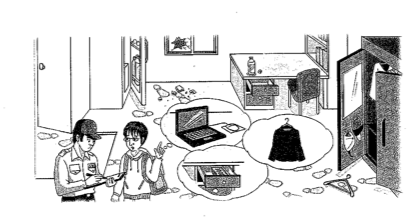
| G7.3 ~어/아 있다: . . . is in the state of . . . |
화장실 문이 잠겨 있어요.
혜교는 화장실에서 뭐 하고 있어요? |
|
거기 써 있네, 한 송이에 3000원이라구 It's written there, 3000 KW per a bundle.
|
~어/아 있다 is used to describe existence of a state:
Speaking Activity
You came home only to find out that there has been a robbery. Describe the state of your place, particularly on the following items:
 |
 |
|
넘어지다 to be tripped over 떨어지다 to fall, drop 깨지다 to be broken 없어지다 to disappear [Lit. become not existing] 켜다 to turn on (the light, raido, TV computer, etc.) 끄다 to turn off 열다 to open 열리다 to be open 닫다 to close 닫히다 to be closed 잠그다 to lock 잠기다 to be locked 놓다 to put down 놓이다 to be put 걸다 to hang (trans.) 걸리다 to hang (intrans.) 나다 to come into existence |
Sample Narration
[NOTE] In actual speech, the pronunciation of some grammatical expressions may vary: -고 [구], -도 [두], ~어 가지고 [가지구/갖구], 그리고 [그리구]